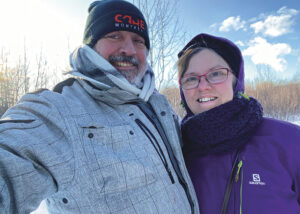“I love my church. It is very important to me, but you won’t be seeing me on Sunday morning as often,” Cara Baergen told her congregation in a sermon preached at Edmonton’s First Mennonite Church this spring.
Consciously choosing to speak from a music stand away from the pulpit, she candidly named hard experiences, health issues and questions of faith that make it difficult for her to show up for worship services. She explained that trying to hide pain and live up to expectations, self-imposed and otherwise, is like wearing a mask. It’s uncomfortable and takes huge energy to maintain.
While this mask serves a useful purpose, allowing participation in community, at the same time it also blocks healthy change in individuals and congregations by hiding the issues. No one wants to “break down” in public, so pretending everything is fine often feels preferable to the risk of having to answer too many “How are you doing?” questions that can drain already depleted emotional reserves. Finally, when the mask is too much to bear, even people who still value their faith and their church will stop attending.
Baergen is far from alone in finding it difficult to be at church. Grief, loss of a job, feelings of inadequacy, faith struggles, depression, shyness, relationship issues, church politics, financial struggle—or even the basic lack of someone to shovel a driveway—can keep people at home on Sunday morning. And missing a few Sundays can make it harder and harder to return.
After a spouse left, “Kelly” (a pseudonym) struggled to go to church. Even though the congregation was supportive, “that crush of well-intentioned people—they were genuine, but I couldn’t handle it—that look of pity that people give you,” she said.
Compounding the difficulties was the shattered expectation that people of faith are supposed to be able to keep their marriages together, even more so when they are leaders in the church. Kelly needed faith and the church community at exactly the time it was the hardest to face those broken expectations. She found it was easiest to arrive late and leave early to avoid questions. “If I couldn’t handle going to my own church, I went to another one where not too many people knew me,” she said. “I could go into a back row and cry through the service.”
A church without masks
Searching for Sunday: Loving, Leaving, and Finding the Church by the late Rachel Held Evans exposes many reasons people have for avoiding church as well as thoughtful approaches to address the pain behind their absences. Using statistics from the United States in 2015, she claimed that “59 percent of young people ages 18 to 29 with a Christian background have dropped out of church.”
In Canada, the ground-breaking 2012 study, “Hemorrhaging Faith,” concluded that two out of every three young adults were leaving the church. Anecdotally, it appears the trend affects adults as well. Congregations have shrunk, adult Sunday school classes struggle to continue and volunteer positions are difficult to fill. Many people seem to be either actively or passively avoiding Sunday morning attendance at church.
Evans wrote: “[W]e long for our churches to be safe places to doubt, to ask questions, and to tell the truth, even when it’s uncomfortable. We want to talk about the tough stuff—biblical interpretation, religious pluralism, sexuality, racial reconciliation and social justice—but without predetermined conclusions or simplistic answers, We want to bring our whole selves through the church doors, without leaving our hearts and minds behind, without wearing a mask.”
The church as a place of belonging and acceptance in the midst of struggle was an attractive concept for Evans. She suggested that the church needs to feel less like a country club, where everyone is well put together, and more like an Alcoholics Anonymous meeting, where brokenness is acknowledged, truth is told and questions are welcome as an important part of being a Christian community. “[N]o decent AA meeting ever began with, ‘Hi, my name is Rachel, and I totally have my act together,’” she wrote.
Evans advocated for a church without “masks,” that welcomes doubt, struggle and questioning. “We come in search of sanctuary, a safe place to shed the masks and exhale,” she wrote. “We come to air our dirty laundry before God and everybody because when we do it together we don’t have to be afraid.”
She didn’t like the idea that people have to have their lives fixed and faith intact before coming to church, likening that attitude to feeling you have to be in shape before joining a fitness club or that the house has to be clean before the hired housekeeper arrives. “We think church is for the healthy, even though Jesus told us time and time again he came to minister to the sick,” she wrote.
Addressing pain and loss in church
One issue that causes people to feel they can’t attend church is how the gathered faith community addresses pain and loss, both corporately and on an individual basis.
Kelly commented that the church, in general, does not lament well. It tends to expect grief to be dealt with and packed away, often quicker than is possible for the person who is experiencing loss. “As a church, if we could understand grieving better, we’d understand that it goes on and on,” she said. “People can look okay and not be. You can be very functional, and not be healed.”
Even though it was hard to find a place to be authentic and open with pain during Sunday morning services, there were times when Evans did find helpful responses to grief. At one church, a trained spiritual caregiver was quietly made available for prayer and anointing to those who were hurting.
At Kelly’s own church, a number of sermons seemed perfectly tailored for her. Messages of hope, courage and even mercy provided words for the journey through loss with all its twists and turns.
Perhaps one of the most helpful ways to address the concept of struggling to go to church during difficult times is to revisit the definition of church and the ways people are involved with it.
Church is much more than a building, a one-hour service on Sunday morning, or a pastor who is always available to everyone. The expectation that the church and its pastor can “be all things to all people” on a Sunday morning is obviously unrealistic, yet it is regularly a part of the expectations people bring with them to church. But, when the definition of church is understood as being a people of God, rather than a building, the idea of attendance and engagement with the church encompasses more than a Sunday service. Both Cara and Kelly found that individual church members who reached out and were there for them were “the church” at critical times, especially when they felt they could not participate fully in the public worship service. Sometimes, showing up at worship and staying at the back of the sanctuary was enough, allowing them to hear what was being said and sung, enabling engagement with a few people, and providing the option of a quick exit when they felt overwhelmed.
Kelly said that one of her pastors had a helpful definition of church: “She always referred to Sunday morning as ‘worship’ [not church]. She said ‘church’ is what we do with our everyday lives.” She added: “I remember somebody asking me about prayer at that time [during crisis]. My response was that I am dependent on the prayers of others. . . The challenge for the rest of us is that you too might be called to be the church in a private way, not in that public hour.”
Thinking of the church as a people instead of a place helps those who are struggling with issues to feel connected even when they cannot bring themselves to attend large public services. There are also ways a congregation can work to make public gathering times more welcoming to those who struggle to attend:
– Offering quiet spaces and times for prayer and connection with spiritual directors, elders or deacons may provide non-threatening opportunities for those with questions and struggles to find a safe place to work through those without having to worry about becoming emotional or expressing difficult thoughts and doubts.
– Small evening gatherings, such as Taizé, prayer vigils or healing services, can invite people to bring pain and issues to a small group that is a less-intimidating place for struggle and worship to co-exist.
Another thing a congregation can do is publicly process difficult issues, and consistently work at the tasks of handling disagreements and conflicts in respectful, open ways while avoiding gossip. While it may feel counter-intuitive for a community to be attractive to newcomers while being open about its problems, this approach attracts those who are looking for faith to be relevant to life’s issues.
Asked about how sharing her story publicly affected her, Baergen said: “It was terrifying beforehand and felt amazing immediately after, with all the love and support I got from everyone. It has led to some really interesting conversations…”
Evans encouraged her readers to “[i]magine if every church became a place where everyone is safe, but no one is comfortable. Imagine if every church became a place where we told each other the truth. We might just create sanctuary.”
Donita Wiebe-Neufeld is Canadian Mennonite’s former Alberta correspondent. She currently works for Mennonite Central Committee Alberta.
For discussion
1. Has attendance dropped at your church in recent years? Is this because people have completely stopped coming or because many people come less often? What are your reasons for missing church?
2. Do you find it difficult to go to church when you’re feeling vulnerable? Do you sometimes wear a mask in order to feel “good enough”? Are there other reasons why we sometimes hide behind masks?
3. Does your Sunday worship experience feel more like a country club or an Alcoholics Anonymous meeting? Does it feel like a comfortable place to ask hard questions, a place that welcomes doubt and struggle? Are there opportunities to be authentic and open? What does it mean to think of the church as a people rather than a place?
—By Barb Draper









Leave a Reply
You must be logged in to post a comment.